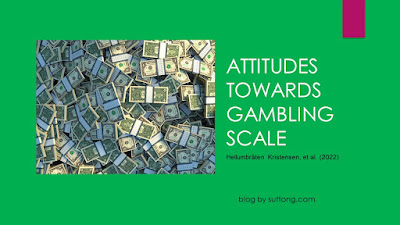Assessment
names: Attitudes Towards Gambling Scale (ATGS)
Scale
overview: The Attitudes
Towards Gambling Scale presents participants with eight items, which are rated
on a five-point scale of agreement to indicate their views about gambling.
Response
Type: Items are
rated on a scale of agreement from 1 = strongly agree, 2 = agree, 3 = neither
agree nor disagree, 4 = disagree, 5 = strongly disagree.
Scale
items: The items include
positive and negative statements about gambling.
Availability: The full set of eight items and labels
for agreement can be found in the PsycTESTS reference.
The scale has been widely used with more than 55,000 participants:
See Hellumbråten Kristensen, et al. (2022) for a literature review.
Reference
for the scale
Hellumbråten Kristensen, J., Trifunovic, S., Strand, J., Kraft
Vistnes, K., Syvertsen, A., Zandi, A., & Pallesen, S. (2022). A systematic
literature review of studies on attitudes towards gambling using the attitudes
towards gambling scale (atgs). International Gambling Studies. https://doi.org/10.1080/14459795.2022.2143856
McAllister,
I. (2014). Attitudes Towards Gambling Scale--Short Version [Database record].
Retrieved from PsycTESTS. doi: https://dx.doi.org/10.1037/t43847-000
McAllister, Ian. (2014). Public opinion
towards gambling and gambling regulation in Australia. International
Gambling Studies, 14 (1), 146-160. doi:
https://dx.doi.org/10.1080/14459795.2013.861001
Reference
for using scales in research:
Buy Creating Surveys on
Reference
for clinicians on understanding assessment
Buy Applied Statistics for Counselors
Resource Link: A – Z Test Index
NOTICE:
The
information about scales and measures is provided for clinicians and
researchers based on professional publications. The links to authors,
materials, and references can change. You may be able to locate details by
contacting the main author of the original article or another author on the
article list.
Links to Connections
Checkout My Website www.suttong.com
See my Books
FOLLOW me on
FACEBOOK Geoff
W. Sutton
TWITTER @Geoff.W.Sutton
PINTEREST www.pinterest.com/GeoffWSutton
Read published articles:
Academia Geoff
W Sutton
ResearchGate Geoffrey W Sutton



Comments
Post a Comment